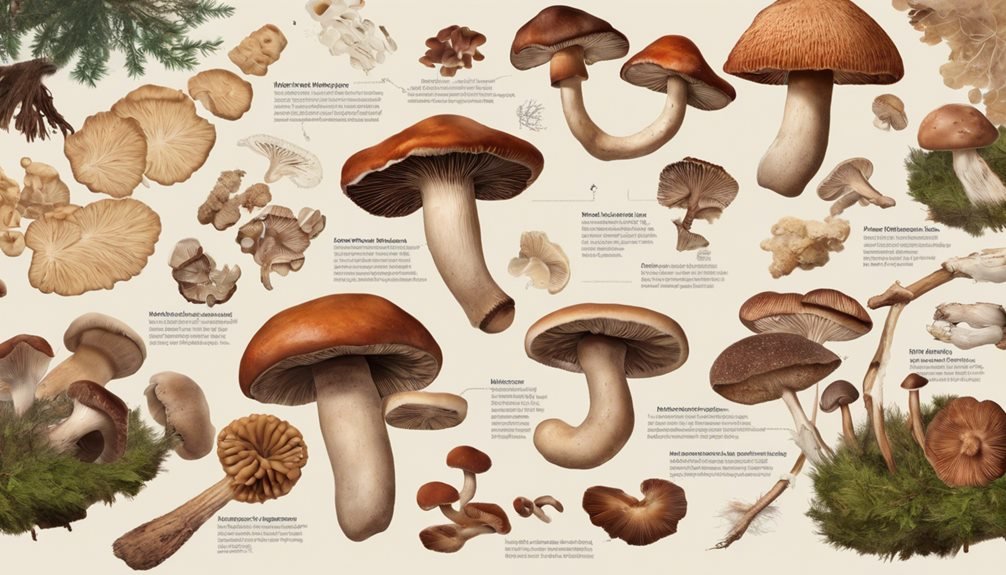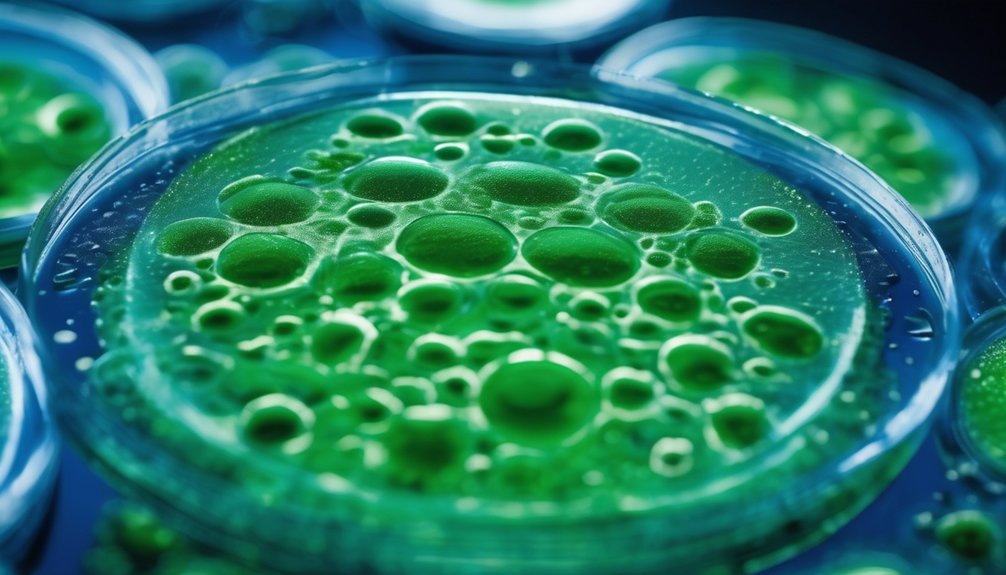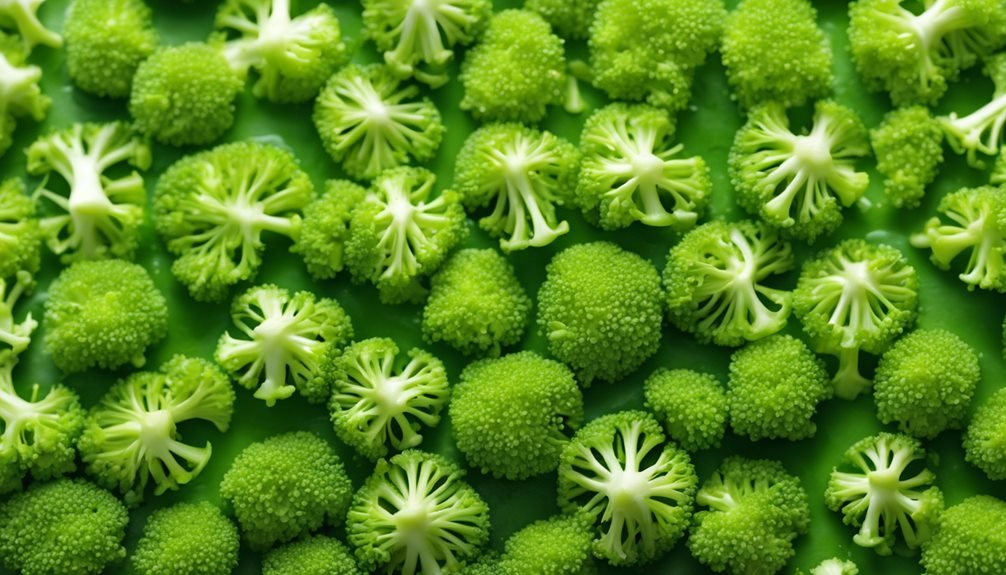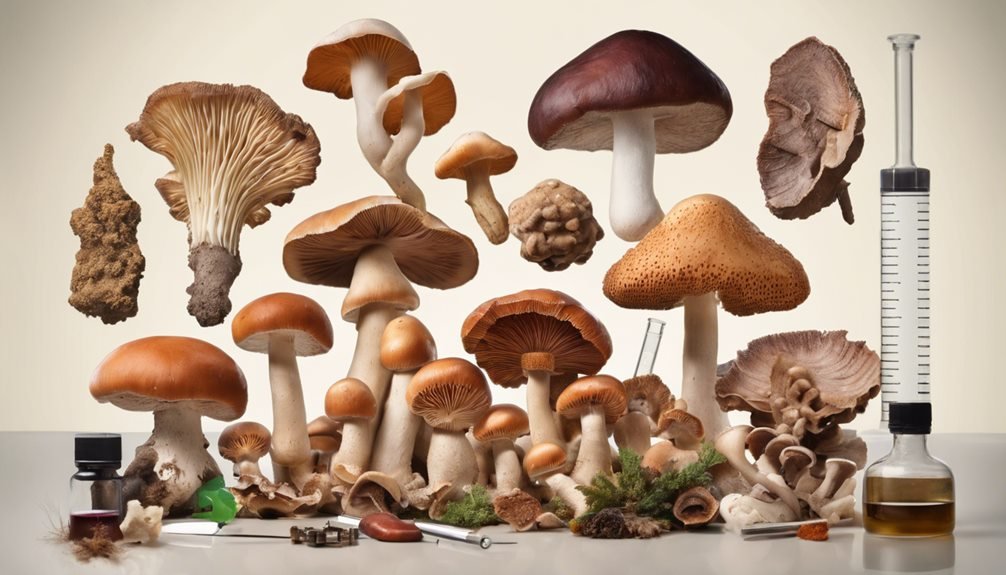You may have heard whispers about the potential of mushrooms in the realm of cancer treatment. While the idea of mushrooms as a natural cure for cancer piques curiosity, it's crucial to approach this topic with a balanced perspective. The intricate relationship between certain mushroom varieties and cancer cells warrants a closer examination, shedding light on their intriguing properties. But before drawing any conclusions, understanding the nuances of this complex interaction is key.
Key Takeaways
- Certain mushrooms contain compounds that inhibit cancer cell growth and promote apoptosis.
- Mushroom extracts can induce cancer cell death and modulate immune responses.
- Clinical trials have shown positive results in supporting immune function and reducing side effects.
- Consult healthcare providers before adding mushroom supplements to cancer treatment.
- Integrating mushroom-based therapies in cancer treatment shows promise in improving outcomes.
The Link Between Mushrooms and Cancer
If you've ever wondered about the potential connection between mushrooms and cancer, you're not alone. Research has shown that certain mushroom varieties possess potent properties that may aid in cancer prevention. Mushrooms like Reishi, Shiitake, Maitake, and Turkey Tail have gained attention for their potential anti-cancer effects.
Studies indicate that these mushroom varieties contain bioactive compounds such as beta-glucans, polysaccharides, and triterpenes, which exhibit anti-tumor, anti-inflammatory, and immune-enhancing properties. These components work synergistically to inhibit cancer cell growth, promote apoptosis (cell death), and boost the body's immune response against cancer cells.
Furthermore, mushrooms rich in antioxidants like ergothioneine and selenium can help reduce oxidative stress and inflammation, both of which are linked to cancer development. Incorporating a variety of mushrooms into your diet can be a natural and flavorful way to support your body's defenses against cancer.
Types of Mushrooms With Anti-Cancer Properties
Various types of mushrooms have been identified for their remarkable anti-cancer properties, offering a natural approach to potentially combatting this disease. Among these, reishi mushrooms are renowned for their medicinal benefits, containing compounds that may help in reducing tumor size and preventing cancer cell growth.
Shiitake mushrooms, commonly used in culinary dishes, also exhibit anti-cancer properties due to their polysaccharides which enhance the immune system's ability to fight cancer cells.
Maitake mushrooms, rich in beta-glucans, have shown promising results in slowing down tumor growth and improving the efficacy of chemotherapy. Additionally, turkey tail mushrooms have been studied for their anti-cancer effects, particularly in breast cancer patients.
These mushrooms can be incorporated into your diet through various culinary uses, such as adding them to soups, stir-fries, or even as a supplement. By including these cancer-fighting mushrooms in your meals, you can benefit from their unique properties that support your overall health and well-being.
Key Compounds in Cancer-Fighting Mushrooms
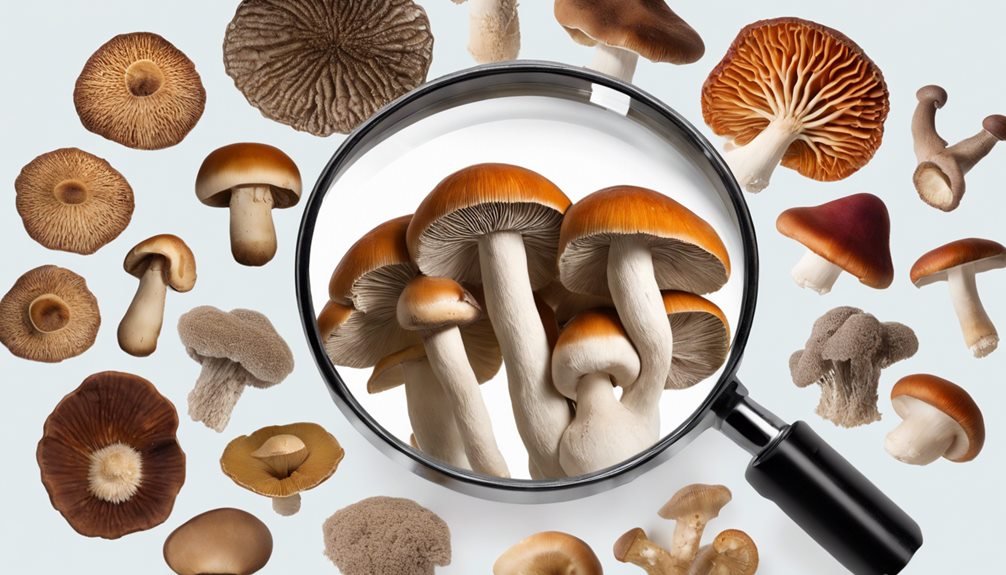
Exploring the realm of cancer-fighting mushrooms unveils a fascinating array of key compounds that contribute to their potent anti-cancer properties. Mushroom bioactive compounds such as polysaccharides, β-glucans, triterpenoids, and lectins have been identified as crucial components in the fight against cancer. These compounds exhibit various mechanisms that can inhibit tumor growth, prevent metastasis, and enhance the body's immune response against cancer cells.
Polysaccharides found in mushrooms, like lentinan and schizophyllan, have shown promising results in cancer immunotherapy properties by stimulating the immune system to recognize and attack cancer cells.
β-glucans, another bioactive compound, possess potent anti-tumor effects by modulating immune responses and reducing inflammation in the body.
Triterpenoids found in certain mushrooms have demonstrated anti-cancer activities through their ability to induce cancer cell death and inhibit tumor angiogenesis.
Lectins in mushrooms have also been studied for their potential anti-cancer properties, showing the ability to bind to cancer cells and induce apoptosis. Understanding the role of these key bioactive compounds in cancer-fighting mushrooms is essential for harnessing their full potential in natural cancer therapies.
Mushroom Extracts and Cancer Cell Growth
Building upon the foundational knowledge of key compounds in cancer-fighting mushrooms, the exploration now turns towards the impact of mushroom extracts on cancer cell growth. Mushroom extracts have shown promising potential in inhibiting cancer cell proliferation through various mechanisms. These extracts contain bioactive compounds that can induce cancer cell apoptosis, a process crucial for halting the growth and spread of cancer cells.
Moreover, mushroom extracts have been found to modulate the immune response against cancer cells, enhancing the body's natural defense mechanisms to target and eliminate these harmful cells.
Studies have highlighted the effectiveness of mushroom compounds in triggering programmed cell death in cancer cells, known as apoptosis, while sparing healthy cells. The unique combination of bioactive components present in mushroom extracts contributes to their ability to selectively target cancer cells and induce their death, without causing harm to normal cells.
This targeted approach to cancer treatment showcases the potential of mushroom extracts as natural agents in combating cancer cell growth.
Potential Mechanisms of Action
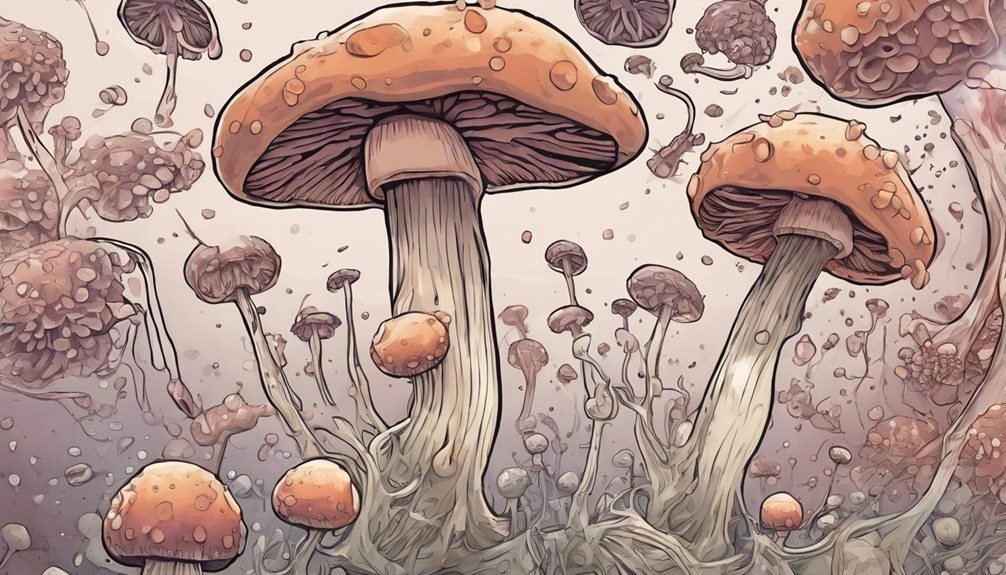
Mushroom extracts exhibit a diverse array of potential mechanisms of action that contribute to their ability to combat cancer cell growth. These mechanisms include:
- Biochemical Interactions: Mushroom compounds may interfere with signaling pathways involved in cancer cell proliferation, inducing apoptosis (cell death) or inhibiting angiogenesis (formation of new blood vessels that supply tumors).
- Immune Modulation: Certain mushroom extracts have been shown to enhance the activity of immune cells like natural killer cells and macrophages, boosting the body's ability to recognize and destroy cancer cells.
- Antioxidant Effects: Mushrooms are rich in antioxidants like ergothioneine and selenium, which can help reduce oxidative stress and DNA damage that contribute to cancer development.
- Anti-inflammatory Properties: Some mushroom extracts possess anti-inflammatory properties that can inhibit chronic inflammation, a known driver of cancer progression.
Understanding these potential mechanisms of action sheds light on how mushrooms may naturally combat cancer growth through complex biochemical interactions and immune modulation.
Clinical Studies on Mushroom Efficacy
As research into the potential anti-cancer properties of mushrooms continues to expand, clinical studies have emerged as a crucial avenue for evaluating the efficacy of mushroom extracts in cancer treatment. These studies aim to provide robust scientific evidence regarding the effectiveness of mushrooms in combating cancer cells. While some clinical trials have shown promising results in terms of tumor reduction and improved immune response, it's important to consider research limitations. These limitations may include small sample sizes, short study durations, and variations in methodologies, which can impact the generalizability of the findings.
Moreover, commercial interests in promoting mushroom-based products for cancer treatment have also influenced the landscape of clinical studies. Some studies may be funded or conducted by companies with vested interests in marketing mushroom supplements. This factor can introduce bias and raise questions about the objectivity of the research outcomes.
Therefore, when evaluating the results of clinical studies on mushroom efficacy in cancer treatment, it's crucial to consider both the potential benefits and the influence of commercial interests on the findings.
Mushroom Supplements and Cancer Treatment
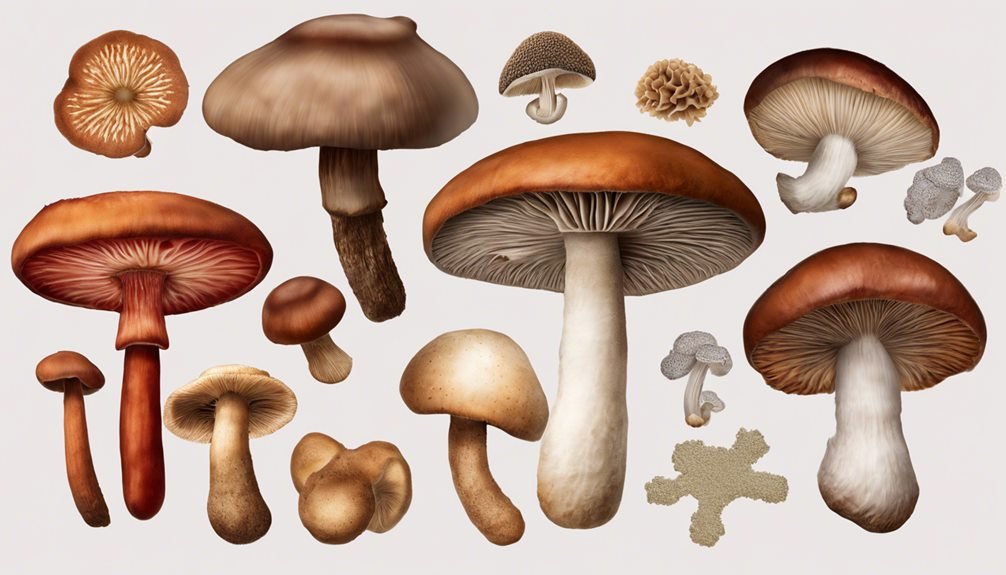
Exploring the realm of complementary cancer treatments, mushroom supplements have garnered attention for their potential role in supporting conventional cancer therapies. Clinical trials have shown promising results in utilizing mushroom supplements alongside traditional cancer treatments. Patient experiences have also highlighted the potential benefits of incorporating mushroom supplements into their cancer treatment regimen.
Here are four key points to consider regarding mushroom supplements and cancer treatment:
- Clinical Trials: Various clinical trials have been conducted to assess the effectiveness of mushroom supplements in cancer treatment, showing encouraging results in terms of supporting immune function and reducing treatment-related side effects.
- Patient Experiences: Many cancer patients have reported positive experiences with incorporating mushroom supplements into their treatment plan, citing improvements in energy levels, overall well-being, and a sense of empowerment.
- Consultation: Before adding mushroom supplements to your cancer treatment regimen, it's crucial to consult with your healthcare provider to ensure compatibility with your current treatment plan and overall health.
- Quality Assurance: When considering mushroom supplements, opt for reputable brands that undergo rigorous testing to ensure purity and potency, enhancing the likelihood of experiencing potential benefits.
Mushroom-Based Therapies in Oncology
In the realm of oncology, the integration of mushroom-based therapies has emerged as a topic of interest for both researchers and healthcare providers. Mushroom immunotherapy, a form of treatment that utilizes the immune-boosting properties of certain mushrooms to enhance the body's natural defense mechanisms against cancer cells, is gaining traction in the field. These therapies aim to harness the anti-tumor effects of mushrooms to improve treatment outcomes and quality of life for cancer patients.
On the other hand, mushroom chemotherapy involves using specific compounds derived from mushrooms to target cancer cells directly. Research into the potential of mushrooms in chemotherapy is ongoing, with promising results indicating their ability to inhibit tumor growth and induce cancer cell death.
Integrating mushroom chemotherapy into conventional treatment regimens holds the promise of enhancing the efficacy of existing therapies and reducing the side effects associated with traditional chemotherapy drugs. As the field of oncology continues to evolve, exploring the therapeutic potential of mushrooms in cancer treatment remains a promising avenue for improving patient care and outcomes.
Mushroom Consumption and Cancer Prevention
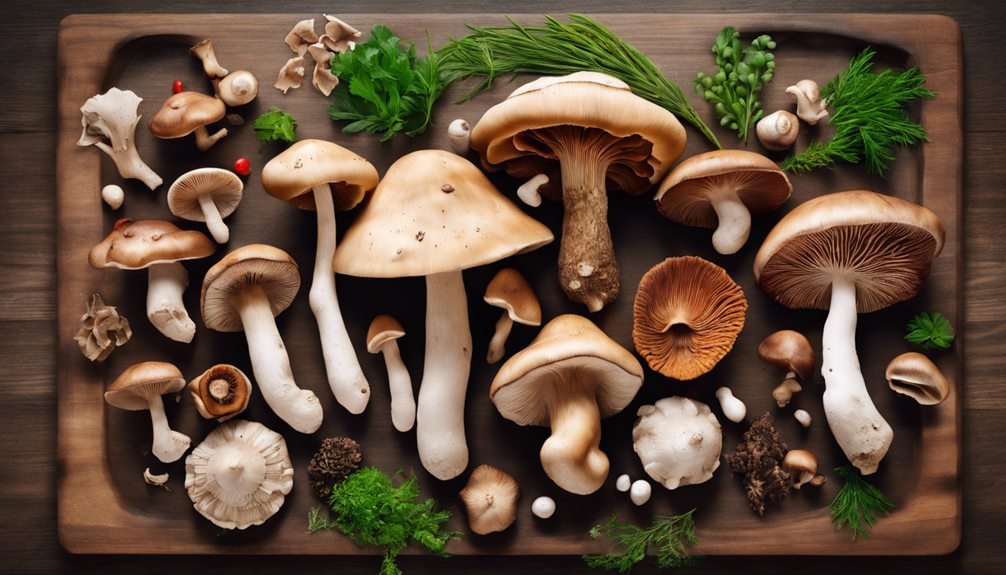
The role of mushrooms in cancer prevention has garnered increasing attention in recent years due to their potential health benefits. Incorporating mushrooms into your diet can offer significant dietary benefits and support your immune system in the following ways:
- Antioxidant Properties: Mushrooms are rich in antioxidants like selenium and vitamin C, which help protect cells from damage caused by free radicals and oxidative stress.
- Anti-Inflammatory Effects: Certain compounds in mushrooms, such as beta-glucans and ergothioneine, have been shown to reduce inflammation in the body, potentially lowering the risk of chronic diseases like cancer.
- Enhanced Immune Function: Mushrooms contain polysaccharides that can help enhance the activity of immune cells, improving the body's ability to defend against infections and abnormal cell growth.
- Nutrient Density: Mushrooms are a good source of various essential nutrients like B vitamins, potassium, and fiber, which are important for overall health and may play a role in cancer prevention.
Safety and Side Effects Considerations
Several safety and side effects considerations should be taken into account when incorporating mushrooms into your diet for potential health benefits, particularly in relation to cancer prevention. It's important to be aware of potential herbal interactions when consuming mushrooms alongside other medications or herbal supplements. Certain mushrooms may interact with medications such as blood thinners or immune-suppressants, so it's crucial to consult with a healthcare provider before adding them to your diet.
Additionally, allergic reactions to mushrooms are possible, especially for individuals with known allergies to fungi. Symptoms of mushroom allergies can range from mild itching and hives to more severe reactions like difficulty breathing or anaphylaxis. If you have a history of allergies to mushrooms or fungi, it's advisable to avoid consuming them or consult with an allergist before doing so.
Incorporating mushrooms into your diet for potential cancer prevention benefits can be a safe and effective approach, but it's essential to consider these safety and side effects considerations to ensure a positive outcome for your health.
Integrating Mushrooms Into Cancer Care

Considering the potential benefits of mushrooms in cancer care, integrating these fungi into treatment plans has gained attention as a natural and complementary approach. When exploring the integration of mushrooms into cancer care, it's essential to consider patient testimonials and the use of integrative approaches. Here are four key points to keep in mind:
- Patient Testimonials: Listening to the experiences of cancer patients who've incorporated mushrooms into their treatment regimens can provide valuable insights into the potential benefits and challenges associated with this approach.
- Integrative Approaches: Combining mushroom-based treatments with conventional cancer therapies, such as chemotherapy or radiation, in an integrative approach may offer a more comprehensive and holistic strategy for addressing the disease.
- Consultation with Healthcare Providers: Before integrating mushrooms into cancer care, it's crucial to consult with healthcare providers, including oncologists and nutritionists, to ensure that the chosen mushrooms are safe and appropriate for individual treatment plans.
- Monitoring and Evaluation: Regular monitoring and evaluation of the effects of mushroom integration in cancer care can help track progress, identify any potential side effects, and make necessary adjustments to the treatment plan.
Future Research and Implications
As you look towards the future of mushroom-based cancer research, exploring new avenues and potential implications becomes crucial. Research funding plays a pivotal role in advancing this field, allowing scientists to delve deeper into the mechanisms behind mushrooms' potential anticancer properties. With continued support, significant advancements can be made in understanding how specific compounds in mushrooms interact with cancer cells, leading to the development of more targeted treatment options.
The implications of further research into mushrooms as natural remedies for cancer are vast. If proven effective, incorporating mushrooms into traditional cancer care could provide patients with additional treatment options that are potentially less invasive or have fewer side effects compared to conventional therapies.
Additionally, exploring the synergistic effects of mushrooms with existing treatments may lead to enhanced outcomes for cancer patients.
Frequently Asked Questions
Can Mushrooms Completely Cure All Types and Stages of Cancer?
When considering mushroom effectiveness in cancer treatment, it's essential to recognize that while mushrooms show promise in some studies, claiming they can completely cure all types and stages of cancer isn't scientifically supported.
Research suggests that certain compounds in mushrooms may have anti-cancer properties and could potentially be used as complementary treatments. However, it's crucial to consult with healthcare professionals and rely on established cancer treatments for best outcomes.
Are There Any Specific Guidelines on Mushroom Consumption for Cancer Patients?
When considering mushroom consumption for cancer patients, recommended dosages vary based on individual health conditions and types of mushrooms. Reishi, turkey tail, and maitake mushrooms are commonly used. It's crucial to consult with a healthcare provider for personalized guidance. Potential side effects, although rare, may include digestive issues or allergic reactions. Always ensure mushrooms are properly sourced and cooked to reduce any risks.
Prioritize a balanced diet and holistic treatment plan for overall well-being.
Do All Mushroom Supplements Have the Same Anti-Cancer Properties?
When it comes to mushroom supplements, not all varieties possess the same anti-cancer properties. Certain mushrooms like reishi, maitake, and turkey tail have been studied for their potential benefits in combating cancer. These mushrooms contain bioactive compounds that may help boost the immune system and have anti-tumor effects.
It's essential to consult with a healthcare professional before incorporating mushroom supplements into your cancer treatment plan for personalized guidance.
Are There Any Risks of Interactions Between Mushrooms and Cancer Treatments?
When considering interactions between mushrooms and cancer treatments, it's essential to be aware of potential dangers. Clinical evidence suggests that certain mushrooms may interfere with the efficacy of cancer medications or treatments.
Always consult with your healthcare provider before incorporating mushrooms into your cancer care plan to ensure they won't negatively impact your treatment outcomes. Monitoring for any adverse effects or changes in your condition is crucial when combining mushrooms with cancer therapies.
Can Mushrooms Be Used as a Standalone Treatment for Cancer?
While mushrooms show promise as complementary therapies in cancer treatment, using them as a standalone cure isn't supported by clinical trials. Always consult with your healthcare provider before incorporating mushrooms into your cancer treatment plan. Remember, they should complement traditional therapies rather than replace them entirely.
Stay informed about the latest research and proceed cautiously to ensure your treatment is safe and effective.
Conclusion
In conclusion, while mushrooms show promise in fighting cancer, the idea of them curing cancer naturally is a bit of a stretch. They can play a supportive role alongside conventional treatments, with certain varieties containing bioactive compounds that inhibit cancer cell growth. Remember, Rome wasn't built in a day, and similarly, the fight against cancer requires a comprehensive approach. Incorporating mushrooms into a balanced diet and consulting healthcare providers can provide valuable support in this battle.
